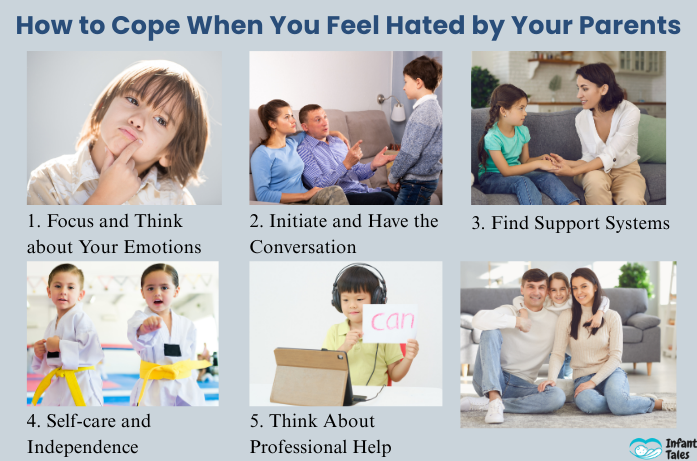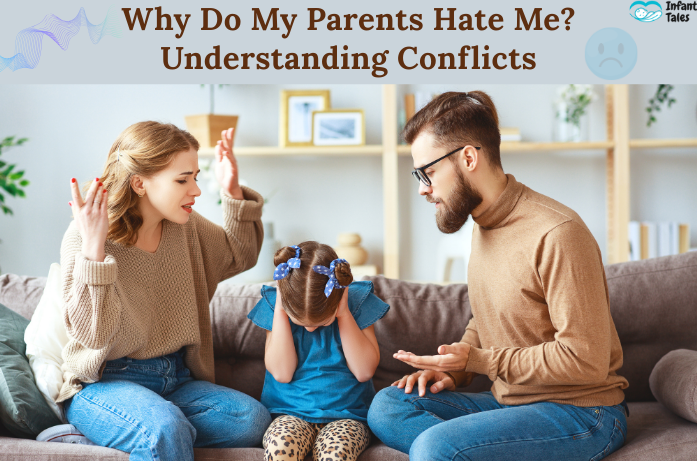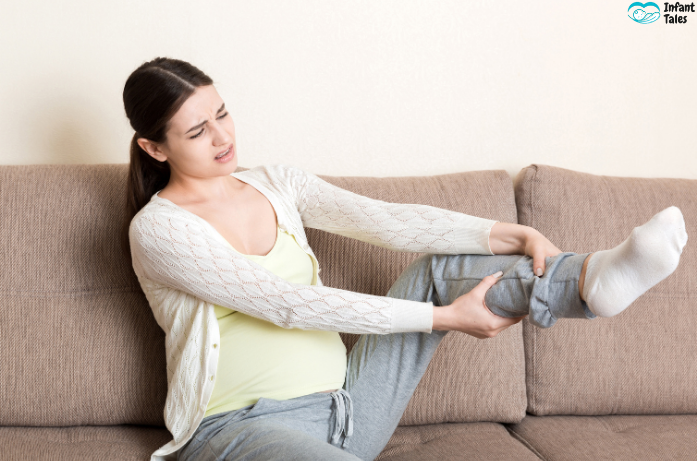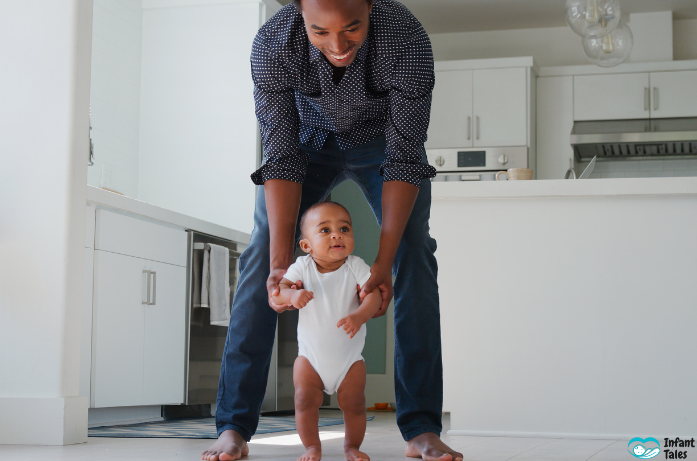By Infant Tales Team
Pretty much every child, teen, or even grown person on the face of this earth has found themselves contemplating: “Why do my parents hate me?” This line of thought can be heavy, baffling, heartrending. Though few parents genuinely “hate” their children, splits, misunderstandings and emotional distance can occasionally make it feel that way.
This article is intended to lead you through the reasons why you feel conflicted, the potential causes of family conflicts and how to begin healing damaged parent-child relationships. Remember, you are not alone in feeling this way, many people go through similar struggles.
Why You Might Feel Like Your Parents Hate You
1. High Expectations and Pressure
Parents frequently have high expectations, whether it’s in the academic, behavioral or life-plan realm. Because this is done from love and wanting what’s best for you, it can come to feel smothering and cause you to lose sight of yourself “enough,” and easily be confused with dislike or even hate. According to the One Word Education high parental expectations can create stress and distance in the parent-child relationship.
2. Communication Breakdowns
Sometimes parents don’t know how to express love in the way their children need. They may not say “I love you” often or be quick to criticize rather than praise, which can lead you to think: “Why do I feel like my parents hate me?” or notice signs my parents don’t love me. Research in attachment theory (John Bowlby) shows that when affection is missing, children may feel emotionally disconnected even if love exists.
3. Generational and Cultural Differences
Parents are often tempted to raise our kids with the values we were raised with, which may not resonate with the lifestyle embraced today. Whether it’s tech habits, dating, gender expectations, or career decisions, miscommunications can arise, and generational differences are a top culprit, according to the American Psychological Association, for tearing families apart.
4. Unresolved Stress in Parents’ Lives
Parents are people and people have financial worries, job stress, unresolved childhood trauma. Regrettably, it’s also true that those tensions can spill over into their parenting, leaving kids feeling as though they are in the path of their anger or frustration.
5. Strict Parenting Styles
Some turn to authoritarian parenting, a style that prioritizes obedience and discipline over open communication. While it’s meant to give children direction, it can come off as cold or controlling, making kids feel unloved.
Is It Hate, Or Is It Something Else?
Hate commonly feels more like misunderstanding, poor communication, or stress. Family psychology research shows that many of these conflicts are temporary and contextual. often repairable through better communication, emotional regulation, and boundaries. Many parents may not hold the tools to initiate affection verbally or nonverbally towards other family members, but that does not mean they don’t care deeply.

How to Cope When You Feel Hated by Your Parents
1. Focus and Think about Your Emotions
Ask yourself, what exactly makes you feel hated – harsh words, or being attacked, or having no support? What you discover will clarify if your hatred is logically based on expectations, communication or something much deeper. Reflection gives clarity before action.
2. Initiate and Have the Conversation
Consider trying to calmly and respectfully express your feelings to your parents. For example: “When you criticize me in front of other people, I feel humiliated, embarrassed, and unloved. Can we discuss this privately instead?”. If you are able to speak without placing blame then they are more likely to listen as a result.
3. Find Support Systems
If your parents cannot provide the support you desire or need, find a person in a trustworthy role in your life, such as a friend, teacher, mentor, or relative. Having healthy connections outside of your family can help you build perspective, obtain encouragement, and provide a sense of happening instead of feeling forgotten. The National Parent Helpline and UNICEF also provide resources for children navigating family conflict.
4. Self-care and Independence
Your value isn’t determined by whether or not your parents approve, and a focus on your own self can help strengthen your coping. Engaging with activities, new skills, or just some positive self-care can increase confidence and can help build a positive sense of independence through your own growth.
5. Think About Professional Help
If you experience a sense of helplessness or emotional injury, then speaking with a counselor, or a therapist, may be in order. The National Institute of Mental Health asserts that therapy offers the tools necessary to work through and process your feelings safely, and enhance relationships.
When It May Be More Serious
Sometimes the thought “my parents hate me” can transform from a common family difficulty into something more resembling toxic parenting or emotional abuse. It is crucial to be aware of the difference between strict rules and troubling behavior. Abuse harms children’s emotional well-being and self-worth.
Warning Signs of Harmful Parenting
Any of the following concerns are a sign that there might be more than misunderstanding:
- Frequent embarrassing and belittling verbal comments: repetitive insults, name calling, and negative, personal comments about you, as a human being, rather than the specific action you took to be wrong, that tear down your self-worth.
- Blocking access to support systems: parents could remove your ability to hang out with friends, meet new people or to participate with youth or community activities, leaving you disconnected or distance yourself from friendships.
- Unsafe conduct or style of punishment: sometimes parents confuse punishment with instilling fear, pain, or lasting physical injury. Parenting and discipline are supposed to guide and redirect to improve behavior, and that should be the ultimate goal.
- Threats and controlling behaviors: used to instill fear or manipulate and control every aspect of your life.
If you see yourself in any of these examples, please realize that you are not alone and these kinds of problems are not your fault. You can reach out to trusted adult family, teachers, and school counselors, or authorities if you feel unsafe. There are organizations like the Child Welfare Information Gateway that can provide helpful resources, direction, and protective support to children and teens that may be dealing with abuse at home.
Advice for Parents: What Children Need Most
Since parents and other caregivers are part of our Infant Tales audience, here are some tips for fostering positive relationships with kids:
- Less talking, more listening. Even if you disagree, kids need to feel heard.
- Strike a balance between affection and discipline. Establish limits while remaining kind.
- Adjust to the times. Today’s parents need to be understanding and adaptable.
- Show Respect. Children will model how they are treated. Respect leads to respect.
Final Thoughts
If you’ve been in a place where you’ve thought “why do my parents hate me?”, I want to empathize with you and remind you that you are probably feeling very real feelings, and those feelings are most likely rooted in misunderstanding or tension and not hatred. Family dynamics are hard, with all of the love, expectations, and personal misalignment.
Healing yourself starts with the understanding of yourself (and your parents). You can work on the family dynamics and communication level by simply taking time to practice empathy, self-boundaries, and asking for the support you need from others.
FAQs
Q1: Is it typical to feel as though my parents despise me?
Absolutely. Many teens and even adults feel this way during arguments. Usually, it stems from misunderstandings rather than true hatred.
Q2: How can I tell if it’s serious?
If there are frequent insults, isolation, or unsafe punishment, these are toxic parenting signs. Seek support immediately.
Q3: Is it possible for strict parents to also love their children?
Of course. Although a lack of warmth can seem like rejection, strictness is often motivated by a desire to provide the best for children
Q4: How can parents better express their love?
Effective ways to show love include listening, recognizing hard work, and finding a balance between kindness and discipline.
At Infant Tales, we feel that every child deserves love and every parent deserves support. 💖 If family struggles feel burdensome, check out our parenting articles for loving and supportive guidance, or share this with someone who could use it.



